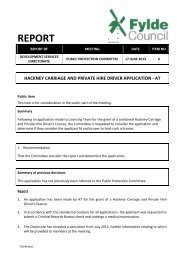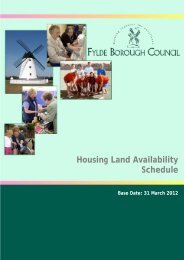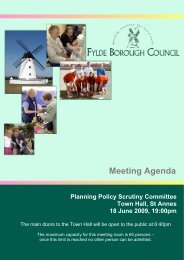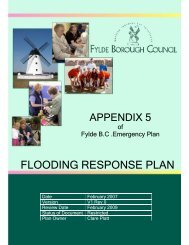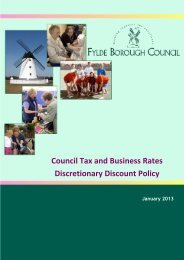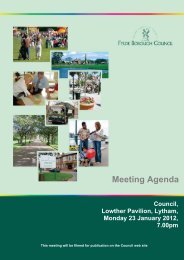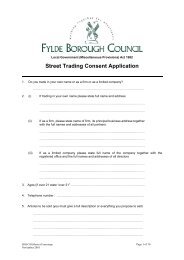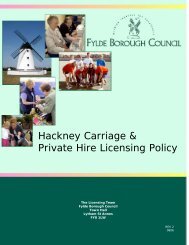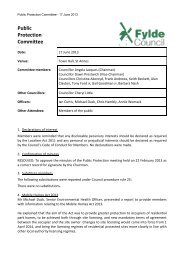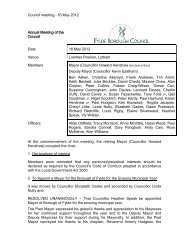Emergency Plan - Fylde Borough Council
Emergency Plan - Fylde Borough Council
Emergency Plan - Fylde Borough Council
Create successful ePaper yourself
Turn your PDF publications into a flip-book with our unique Google optimized e-Paper software.
<strong>Emergency</strong> <strong>Plan</strong> February 2007<br />
The following will be considered: -<br />
• Making an application under the terms of the Bellwin Scheme<br />
• Investigating other available grants from Central Government and/or the<br />
European Union.<br />
• Pursuing organisations responsible for causing damage and/or pollution.<br />
• Encouraging those with insurance to make appropriate claims<br />
• Use of the money raised by public appeal.<br />
8.20 Public Appeals & Donations (Disaster Funds)<br />
The response to emergency appeals can be immediate and overwhelming. The task of<br />
organising the response, arranging for storage facilities and the co-ordination of distribution<br />
can be enormous. If such an appeal is made and the <strong>Council</strong>’s resources become overstretched,<br />
the support of the voluntary agencies that have experience in this type of operation,<br />
such as the British Red Cross, would need to be sought.<br />
If donations of money are received, the Finance Unit of the <strong>Council</strong> will arrange for the<br />
necessary accounts to be set up to ensure fair and equitable distribution of the funds.<br />
The British Red Cross have produced a guidance document which contains advice upon the<br />
legal requirements for establishing and administering such funds entitled ‘Disaster Appeal<br />
Schemes’ (United Kingdom). A copy can be found on the <strong>Emergency</strong> <strong>Plan</strong>ning Shelves of<br />
Room 112 (Environmental Protection).<br />
8.21 Litigation<br />
Analysis of major incidents is now typically accompanied by legal considerations. Often these<br />
will be questions of financial reimbursement or insurance disputes but there may also be<br />
litigation direct against the <strong>Council</strong>. Legal issues may continue for many years. It is important<br />
to note that some high profile events from the 1980’s are still ongoing. There is an increasing<br />
tendency for Public Enquiries to be called.<br />
8.22 Judicial Process<br />
The severity and scale of the incident will dictate the number and type of Inquiries (whether<br />
judicial, public, technical, inquest or of some other form) that the <strong>Council</strong> may become<br />
involved in. It is the responsibility of all who become involved in managing both the immediate<br />
response and the restoration phase to ensure that comprehensive and accurate records of all<br />
events, decisions, reasoning behind key decisions and actions taken. These records may<br />
need to be made available for scrutiny by the appropriate agencies and if necessary used as<br />
evidence in a court of law.<br />
The recording and preservation of information is fundamental to the conduct of the various<br />
investigations and enquiries that usually follow an emergency and are subject to the<br />
provisions of the Freedom of Information Act 2000. Good record keeping serves a further<br />
purpose, whether or not there is a formal inquiry. It allows lessons to be identified and made<br />
more widely available for the benefit of those who might be involved in future emergencies.<br />
Section 8<br />
40<br />
Uncontrolled if Printed<br />
Rev.0



